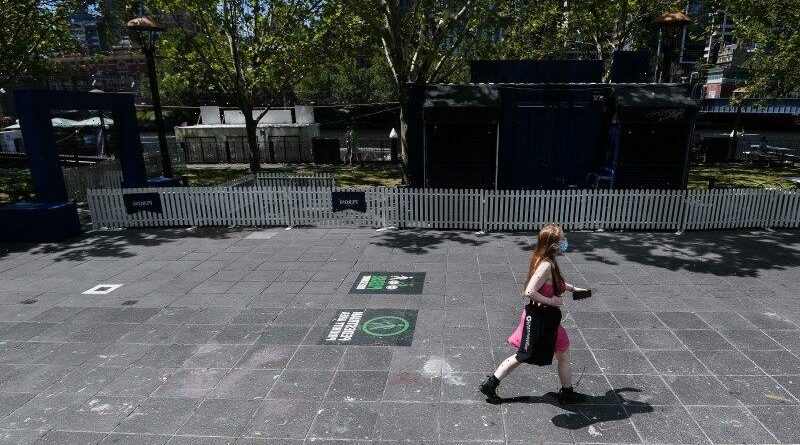Omicron empties city streets again as business pleads for support
Our live coverage of the coronavirus pandemic is free for all registered readers. Please also consider supporting our journalism with a subscription.
The Omicron variant of COVID-19 has driven shoppers, workers and commuters from Melbourne city streets the latest official data shows, as the state government remains unmoved by pleas for the return of pandemic business support.
With many major CBD employers including the Victorian public service in work-from-home mode, foot traffic in central Melbourne plunged by 50 per cent in some key locations this week while public transport use across the greater metro area has declined dramatically, according to smartphone data collected by Apple.
Near-empty street in Southbank on Thursday.Credit:Joe Armao
The nation’s peak body for small business told The Age on Thursday that staff shortages imposed by the Omicron strain had forced many operations into effective lockdown and that government help was urgently needed.
But Premier Daniel Andrews said the state had already provided more than $10 billion in business relief since the beginning of the pandemic and that he had “no announcements” on any further help for the sector.
The City of Melbourne’s foot traffic tracker on Bourke Street Mall recorded just 923 pedestrians between 5pm and 6pm on Wednesday, down more than 50 per cent on the previous four-week average, and just one-third of the people typically on the street at that time in the year before the pandemic.
But the city remains busier than during the lockdown periods of 2020 and 2021 when fewer than 200 pedestrians would pass the tracker between 5pm and 6pm.
Across the greater metro area on Tuesday, Apple recorded public transport trips down 36 per cent from average levels and walking journeys were down by 15 per cent with a 7 per cent increase in Melburnians driving.
Lord Mayor Sally Capp said the city had been recovering before Omicron hit.
“After an incredible festive period which saw the buzz return to our city streets and foot traffic near pre-pandemic levels, so far this year we’re seeing more Melburnians opting to stay home,” Cr Capp said.
“Many city businesses are suffering from staff shortages because of COVID-19 cases and isolation requirements – and now they’ve been hit with a double-whammy as office workers are being advised to work from home if they can.”
Council of Small Business Organisations of Australia chief executive Alexi Boyd said staffing shortages were having the same effect on many businesses as a lockdown.
“The reality is small businesses are in lockdown right now,” Ms Boyd said.
“They haven’t got the staff to be able to open up, everybody’s operating at reduced hours at the very least and many have closed, particularly the service industry…hair and beauty, hospitality and live events are decimated.”
Ms Boyd said her organisation was in talks with state governments, asking for “tailored” relief packages including rent relief to be re-introduced or extended, but had been given no indication of whether more aid would be forthcoming.
“They are listening, but it’s whether or not they implement the strategies that we’re suggesting,” she said.
Mr Andrews gave no indication at his COVID-19 briefing on Thursday that the government would again provide cash subsidies to struggling businesses or extend its commercial tenancy relief scheme, which comes to an end on Saturday. The state opposition is calling for it to continue.
“Businesses are open, there are no lockdowns, there’s no restrictions,” the Premier said. “I understand that there are significant impacts because of the availability of staff, but I’m not here today to make announcements about business support.”
The Morning Edition newsletter is our guide to the day’s most important and interesting stories, analysis and insights. Sign up here.
Most Viewed in National
From our partners
Source: Read Full Article


